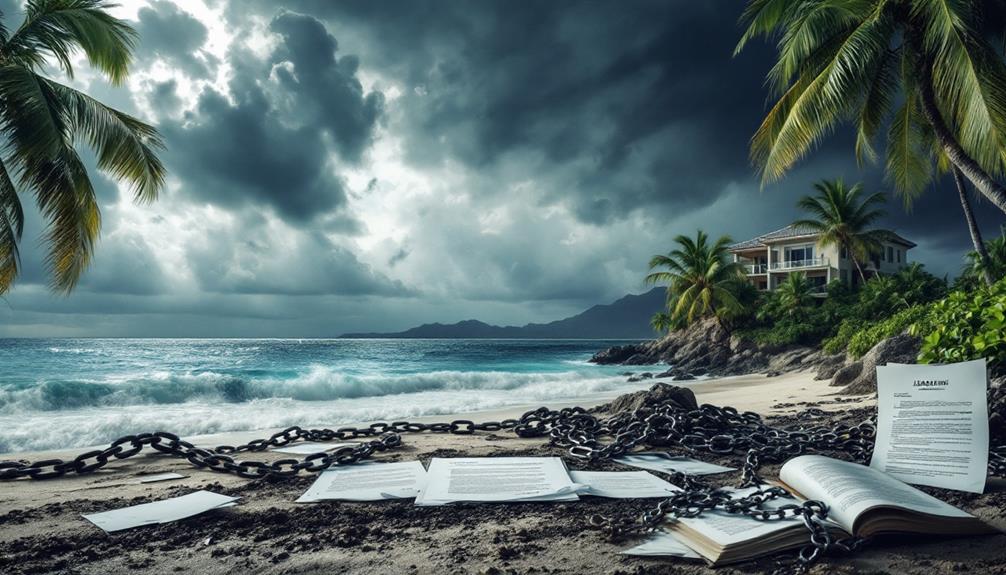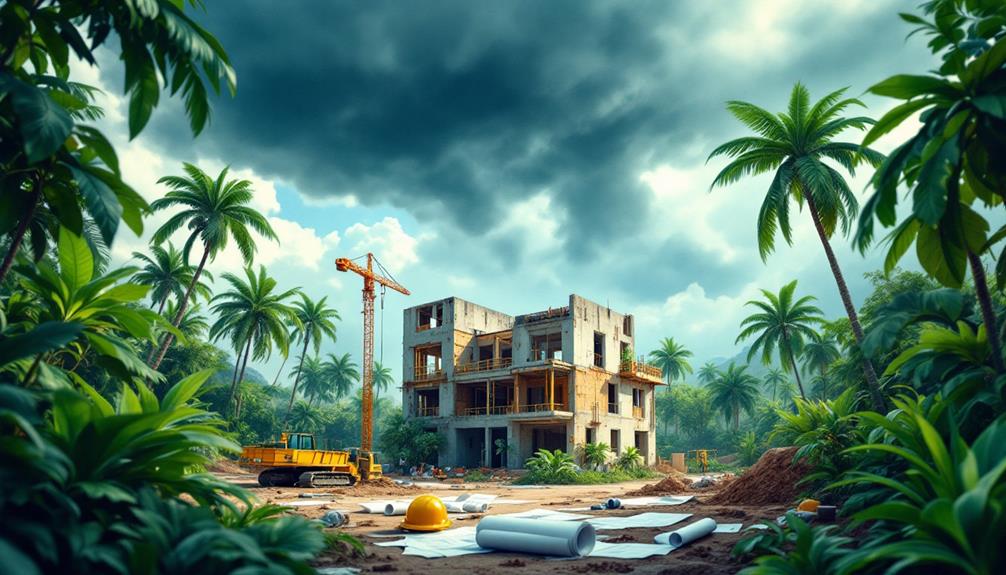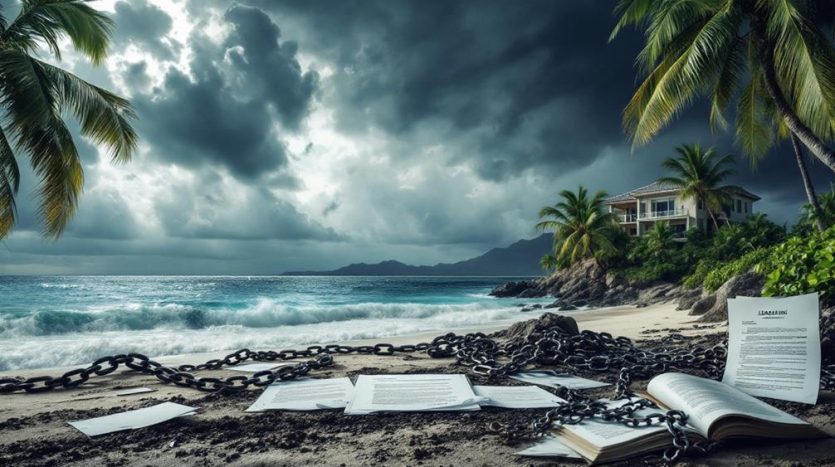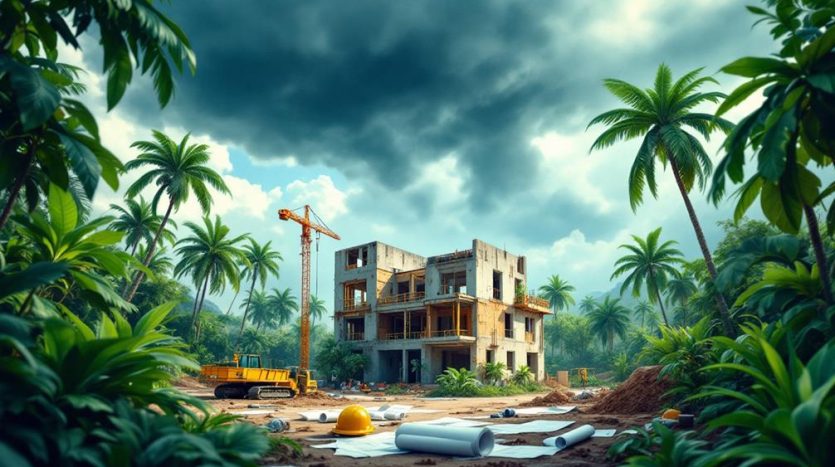What Are the Risks of Buying Property in Thailand?
Have you ever wondered if the allure of owning property in Thailand is worth the potential pitfalls that come with it? Legal restrictions can make it tricky for foreigners, as you're limited to 49% ownership in condominiums, and you can't own land outright. Leasehold agreements might seem like a workaround, but they often come with vague renewal terms that leave you in limbo. Market volatility also poses a risk, as economic shifts and tourism downturns can affect property values. And that's not even touching on the reliability of developers. Curious about how to navigate these challenges?
Key Takeaways
- Foreign ownership is limited to 49% in condominiums, complicating purchase options for non-Thai buyers.
- Market volatility, influenced by economic fluctuations and tourism trends, affects property values significantly.
- Leasehold agreements are typically capped at 30 years, with renewal terms often uncertain and complex.
- Developer reliability issues, such as project delays, necessitate thorough research of the developer's reputation.
- Foreigners face land ownership restrictions, making leaseholds the primary option with ambiguous tenant rights.
Legal Restrictions on Ownership

When considering buying property in Thailand, one must navigate various legal restrictions on ownership. Now, don't let this scare you away. It's like a game of Monopoly, but with more paperwork and less chance of landing in jail.
The Thai government limits foreign ownership to 49% of the total floor area of a condominium building. So, if you've got your heart set on owning a charming villa, you'll need a Plan B. Typically, foreigners can lease land long-term, often for up to 30 years, but owning it outright? That's a no-go.
In some cases, leasehold agreements provide an opportunity to extend the lease for up to 90 years, but automatic renewals aren't guaranteed. Additionally, foreigners can explore indirect investment strategies through a Thai Limited Company or a Thai spouse, although these come with their own legal complexities.
Title verification becomes your best friend in this process. Without it, you might just find yourself the proud owner of a property that doesn't actually exist—or worse, belongs to someone else.
Carry out a thorough title investigation, and make sure the seller has the legal right to transfer the property. While you're at it, verify the title deed with the Land Department to avoid any unpleasant surprises.
Market Volatility Concerns
Market volatility in Thailand's property sector is a vital concern for potential buyers. You wouldn't want to buy a dream property only to watch its value nosedive faster than your last attempt at making soufflé.
Economic fluctuations in Thailand can be as unpredictable as a monsoon, with GDP growth rates dancing between 2.5% and 4.5% over the past decade. These fluctuations impact property prices, leading to swings that can threaten your investment strategies.
It's essential to recognize that regional cost variations also play a significant role in these price swings, with urban areas typically experiencing higher volatility than rural ones.
When the economy sneezes, property values often catch a cold. For instance, if tourism—a major economic driver—takes a hit, property values in tourist hotspots might tumble. In 2020, tourism fell by over 80%, and property prices in some areas followed suit.
It's like investing in a roller coaster ride, except without the safety harness.
To navigate this uncertainty, consider diversifying your investment strategies. You might want to balance your Thai property investment with assets in more stable markets.
Also, keeping an eye on economic indicators is vital. Just remember, while data mightn't be as exciting as a Thai full moon party, it could save your investment from a hangover.
Leasehold Agreement Challenges

Maneuvering leasehold agreements in Thailand can be a complex task for potential property buyers. With lease durations typically capped at 30 years, the clock's ticking faster than a caffeine-fueled cheetah. You might think, "Hey, 30 years is a long time," but blink twice and you're halfway through, with tenant rights that might feel as elusive as finding a parking spot in Bangkok.
It's essential to highlight that leases in Thailand often last for one year, though negotiation options are available. Data suggests that over 70% of foreign property transactions in Thailand involve leaseholds. You'd better brush up on your legalese because renewal options are often as clear as a murky bowl of tom yum soup.
Tenant rights aren't always straightforward, meaning you could end up in a legal labyrinth, questioning every decision that led you here.
Now, let's add a sprinkle of humor to this spicy mix. Imagine you're signing the lease, and it feels like you're auditioning for a role in a legal drama. You might find yourself thinking, "Do I get an Oscar for this?"
In reality, understanding lease duration and tenant rights is vital. If you're not careful, you could be left with a property that's more Houdini than home, disappearing at the end of the lease.
Property Rights Issues
Maneuvering the intricacies of leasehold agreements might've you feeling like a legal aficionado, but understanding property rights in Thailand introduces a whole new set of challenges.
If you're pondering foreign ownership, brace yourself. Thai law restricts foreigners from owning land outright, meaning you'll be tiptoeing around legalities like a cautious tourist at a street market. Instead, you might find yourself steering through the labyrinth of leaseholds, where land tenure is your only solace.
It's essential to evaluate regional price variations when exploring property options, as prices can fluctuate greatly based on location, amenities, and property type.
In Thailand, foreigners can only own condominiums under certain conditions—namely, as long as no more than 49% of the building is foreign-owned. So, if you're hoping to find your slice of paradise, make sure you're not the 50th person in line.
For land, you're generally limited to a 30-year lease, with potential extensions that are as reliable as a tuk-tuk driver's shortcut. Data from the Ministry of Interior highlights that foreign ownership accounts for a mere 2% of total land area, so you're not alone in this quest.
Developer Reliability Risks

When evaluating property investments in Thailand, determining developer reliability is essential. You wouldn't want your dream condo turning into a never-ending construction saga, right?
Start by researching the developer's reputation. A good developer reputation can be your crystal ball, predicting whether your future home will be completed on time or become a ghostly shell of missed deadlines.
In 2022, a staggering 45% of property buyers in Thailand encountered delays in project completion. Now, that's not just a minor hiccup—it's almost like buying a plane ticket for a flight that's perpetually delayed.
Developers with a track record of on-time delivery and high-quality builds are your best bet. They're like the unicorns of the property world—rare but worth every penny.
Don't forget to dig into past projects. Check if they've left a trail of satisfied clients or a wake of disgruntled ones.
Online reviews and forums can be as enlightening as a Sherlock Holmes novel. Consider it part of your due diligence—after all, who wants to invest in a project that's more drama-filled than a reality TV show?
In short, do your homework. Your future self—and bank account—will thank you.







